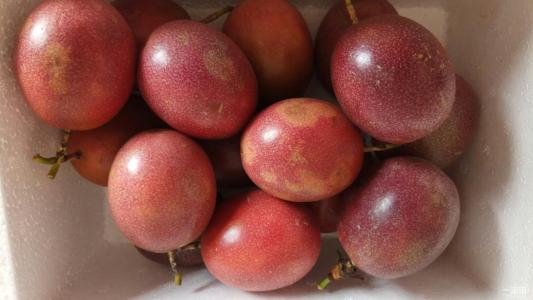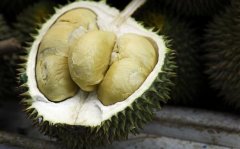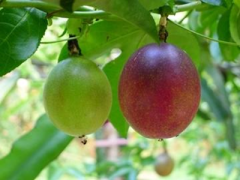What are the characteristics of Tainong No.1 passion fruit? Is the No. 1 passion fruit seedling grafted?
In 1982, the Fengshan Branch of the Agricultural examination Institute successfully developed the passion fruit variety "Tainong No.1". Because of its large fruit, good flavor and high yield, "Tainong No. 1" has been welcomed by the market and farmers. Commercial cultivation has developed since then, and it is still the most important variety in Taiwan.
"when it comes to a virus, the industry is almost destroyed. Chen Chin-chih, an assistant researcher in the Plant Disease Group of the Agricultural Test Institute, points out that in 1985, the planting area of passion fruit in Taiwan reached 1213 hectares, and because of the rapid spread of virus disease every other year, the yield of passion fruit in Taiwan plummeted, leaving a cultivation area of about 300 hectares. and then encountered different virus damage several times. Agricultural testing Institute said that the virus harm is the most important threat to passion fruit cultivation. In particular, passion fruit infected by Lignification virus, the fruit will become smaller, Lignification, and the juice rate is low, the flavor becomes worse, which has a great impact on yield and quality.
Chen Jinzhi said that after the outbreak of virus infection, Taiwan began to implement the production mode of renewing healthy grafted seedlings in the whole garden every year, coupled with the agricultural testing institute's successful development of important virus detection technology for passion fruit in Asia, which can detect a total of six important virus species of passion fruit. To help grasp the health status of passion fruit seedlings. Although the virus cannot be removed after infection, through the screening of high-quality seedlings and control from the source, the passion fruit industry has gradually recovered. In 2016, the planting area of passion fruit in Taiwan reached 682 hectares, and the total output value of fresh fruit, seedlings and processed products reached 700 million yuan. the seedling export industry is also growing.
In 1981, the "Tainong No. 1" was successfully developed, and Taiwan began to plant a large amount of it. Before it was infected by the virus, the planting area of passion fruit in Taiwan had reached 1213 hectares.
Industry has a consensus to implement source management
"now seed and seedling merchants will submit them for inspection on their own, but if they don't, farmers don't want to buy them. Zhang Ruizhang, head of the plant pathology team of the Agricultural Test Institute, says that at present, Taiwan's commercial passion fruit farmers have a consensus that in order to avoid the harm of the virus, old plants will be cut off every year and healthy seedlings will be purchased and replanted. Chen Jinzhi added that the third to fifth month of passion fruit planting is the key. If the seedlings have not been renewed in the neighboring fields, they should be covered with an anti-insect net until everyone has been renovated to avoid infection.
Zhang Ruizhang points out that although passion fruit is originally a perennial fruit tree, it is now dominated by one kind of fruit a year. Because healthy seedlings may also be infected by a variety of vectors in the process of planting. If one strain is infected, it is likely to spread to the whole garden or even other parks. Therefore, the annual renewal of healthy seedlings is the safest mode of production at present.
"this testing technology is mainly aimed at seed and seedling farms, and now they are all sent to agricultural testing institutes for testing, and manufacturers who hope to have technical transfer in the future. Chen Jinzhi said that at present, there are more than five large-scale passion fruit seedling farms in China, and new seedlings are regularly sent to agricultural testing centers every year to get test reports to prove the health status of the seedlings sold. Chen Jinzhi also pointed out that at present, the Agricultural Test Institute can detect six important viruses in Asia, of which four viruses can use serum, which is more economical to detect, while the other two viruses must be tested with nucleic acid, which is about 10 times the price of serum. In response to the gradual warming of the domestic passion fruit industry and the increasing demand for testing, manufacturers are welcome to apply for technology transfer in the future.
Originally perennial passion fruit, in order to prevent and control virus diseases, farmers replant healthy seedlings every year, successfully overcome the threat of the virus, steadily produce high-quality passion fruit, and promote the growth of passion fruit seedling industry.
Domestic fresh fruit is in short supply, and export seedlings are also strong.
Chen Jinzhi added that passion fruit can eat fresh fruit, and it is also very suitable for processing. It has a wide range of applications, and the demand is also growing. In 2016, Taiwan's passion fruit produced 9397 metric tons of fresh fruit, and domestic demand has fallen short of domestic demand. The output value per unit area ranks sixth among fruit trees, with an output value of about 840000 yuan per hectare. It is a fruit tree crop with high economic value, and the planting area is increasing year after year.
The Agricultural Test Institute points out that the seedlings of "Tainong No. 1" are grafted seedlings, and this grafting technology is among the leading in the world. In addition to supplying domestic demand, the seedlings produced in Taiwan have also been exported to Vietnam and other places in Southeast Asia. It is pointed out that "Tainong No. 1" is an international seedling with competitive advantage in Asia because of its good quality and good health in testing and screening.

- Prev

Introduction of XO durian and D24 durian varieties, what are the differences between XO durian and D24 durian?
Do you like durian? Do you know XO durian and D24 durian? These two kinds of durian are acquainted with each other. If you want to know more about it, let's take a look at it together. XO durian, if you like your durian strong and bitter, XO is not to be missed. XO durian
- Next

What is the difference between Tainong No. 1 passion fruit and Purple Fragrance No. 1 passion fruit? How about Purple One?
Do you like passion fruit? Zixiang No. 1 and Tainong No. 1 passion fruit, these two passion fruits are very familiar colors are purple, but Zixiang No. 1 is purple, Tainong No. 1 is purple, if you don't look carefully, you won't be able to tell them apart. What else do they have?
Related
- A course of planting techniques and methods on how to grow carrots
- How to plant the latest tulips?
- Is it better to pick tea in the morning or in the afternoon? When is the best time for tea to be picked? what is the third or fifth tea?
- Launch Yuanxiao Happy combination Haocha + Tea Yuan healthy Taste
- Penghu Tourism "Fireworks 20 Parade with You"
- 2022 West Lake Happiness holds "Digital Revitalization Voucher" and draws iphone13 and laptop.
- Banqiao Fuzhou social houses are designed to change start-up combined with police elimination to create a safe and livable environment
- The convenient measure of "mechanical weeding" in Xinbei has been abused and the Agriculture Bureau has imposed heavy penalties on the illegal land consolidation.
- Changgeng University Joins Hands with Four Memory Factories to Rescue Memory Talent Shortage
- The list of Taiwan's top 100 MVP managers is listed by the Director-General of the Farmers' Association of Sanxia District.

